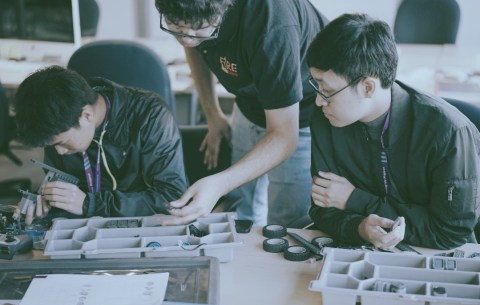Approximately, we spend 12 years at school – 6 years in primary, 3 years in junior high, and 3 years in senior high. To pass from one stage to another, we undergo a couple of assessments to measure whether or not we are qualified to continue to the next stage. This cycle goes on and on from generation to generation.
We learn so many things across multiple subjects with different levels of difficulty during our formal education. But when it comes to practical skills needed in real life, there are things that we don’t get from school.
Things are more complex in real life. And we need to be equipped with skills that we can only find outside the classroom. If completing the 12-year-formal education could guarantee a certificate to enter university and an opportunity to have a certain career path to make a living, these outside-the-classroom skills are what we require to succeed in life as a whole.
Communication Skills
![]()
Photo by rawpixel on Unsplash
How to engage and connect with other people, how to maintain good eye contact, and how to manage smiles in a face to face interaction are some aspects of communication skills that we don’t learn from school. And communication skills, the way we communicate with people, has a very significant impact on our success whether in professional or personal life. With good communication skills, we will have the ability to interact better with others, we could understand them well, we could win their trusts, and we could build strong networking.
Learning from Failures

Photo by Gyorgy Bakos on Unsplash
Having bad grades is every student’s nightmare while getting good grades is what all students desire. But things are sometimes out of our hand. Students can’t always consistently do great on every exam and every subject. Is it considered a failure to have bad grades? Yes, it is. But is it bad to fail? No, it’s not, instead, it’s okay to fail.
Hiromu Arakawa in her critically acclaimed manga Fullmetal Alchemist said, “A lesson without pain is meaningless. For you cannot gain anything without sacrificing something in return.”
The pain of failure is one of life greatest lessons. It teaches us to reevaluate, to reflect, and to improve. More importantly, failure makes us realize that "It's not the end of the road!" It took over 10,000 time-failed experiments for Thomas Edison to finally invent the electric light bulb.
Ability to Adapt

Photo by Bry Ulrick on Unsplash
In life, change is inevitable. We cannot demand the situations or circumstances to stay the same or to be what we want them to be all the time. But we can control the way we act under those circumstances. The ability to adapt towards different circumstances is what makes us survive and succeed in personal and professional life.
As the saying says, “We cannot control the ocean, but we can control our ship to sail the ocean.”
Applying for Jobs

Photo by Saulo Mohana on Unsplash
There is probably no class that teaches us how to apply for jobs in school. We are never taught how to write an excellent resume, how to job hunting, or how a hiring process works. Where do we learn all of these?
Thankfully, in this digital age, there are plenty of online media platforms which provide online workshops and consultations on how to get a job.
Discovering and Exploring Passion

Photo by Vooya
In school, we are obliged to learn so many subjects because the curriculum tells us so. However, we are fully aware that we can't be good at everything. This condition closes our chance to only explore certain subjects that catch our interest the most and to ignore other subjects we don't really like.
Let’s learn from J.K Rowling and Bill Gates. The key to their success is passion. They know what subjects they like and are really good at. They are consistent and persistent, spending most of their time exploring the subjects and making the most of them. As a result, they can successfully create phenomenal things which impact the entire world.
Knowing our passion helps us to focus on specific subjects. By focusing on the subjects, we could explore deeper and obtain thorough insight. At last, we could start projecting our future, planning on a long-term goal related to the chosen subjects. But the bad news is the curriculum in school doesn’t give us the opportunity to do so. Therefore, we need to find a way beyond the classroom walls.
Experiential study tour is a modern learning method to help us discover and explore what our genuine passions really are. In this study tour, we will travel to the world’s most inspiring cities such as London, Tokyo, and Sydney and immerse ourselves in extraordinary workshops across multiple disciplines including STEM, social sciences, arts, sports, and personal education. By learning multiple subjects first-hand, we will understand which subjects we are most passionate and in which subjects we can maximize our potentials.
Are curious about what your true passion really is? Head to this page http://vooya.id/vooyajourney and start your daring adventure!

